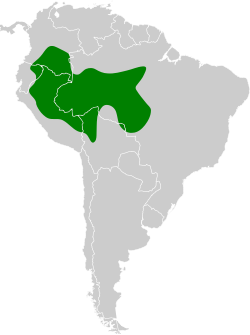Description
The elegant woodcreeper is a medium-sized member of its genus, with a longish, slim, nearly straight bill. The species is 18 to 22.5 cm (7.1 to 8.9 in) long; males weigh 31 to 38 g (1.1 to 1.3 oz) and females 29 to 35 g (1.0 to 1.2 oz). The sexes have the same plumage. Adults of the nominate subspecies X. e. elegans have a blackish brown face with bold buff streaks, whitish lores, and a pale supercilium. Their crown and nape are dark olive-brown with small buff spots with blackish edges that are streakier on the nape. Their back is paler brown than their face, with buff teardrop-shaped spots with blackish edges. Their wings, rump, and tail are cinnamon-rufous to rufous-chestnut with darker tips on the primaries. Their wing coverts have buffy stripes or spots. Their throat is buffy whitish with a scaly appearance at its lower edge. Their breast, sides, and upper belly are grayish olive-brown; the breast and sides have buffy teardrops or chevrons with blackish edges. Their lower belly and undertail coverts are more ochraceous with weak or no streaks. Their iris is light chestnut to dark brown, their maxilla dark brown to black, their mandible gray to bluish gray with a brownish tip, and their legs and feet dark gray, greenish gray, or bluish olive-gray. Juveniles are similar to adults but are darker with fine streaks on their upper back. [4] [5]
Subspecies X. e. ornatus of the elegant woodcreeper is similar to the nominate, but overall warmer in color, with larger spots on its upper- and underparts, and deeper rufous wings, rump, and tail. X. e. buenavistae is also similar to the nominate, but somewhat grayer than ornatus. Its bill is paler and its upper back is less rufous with less obvious streaking on the wing coverts. X. e. insignis has plain (unstreaked) wing coverts and its upperparts' streaking is mostly confined to the upper back and is narrower and longer than the nominate's. X. e. juruanus is slightly larger than the other subspecies. It also has plain wing coverts, and its underparts' spots are smaller than the nominate's and mostly on the upper breast. [4] [5] [6]
Behavior
Movement
The elegant woodcreeper is a year-round resident throughout its range. [4]
Feeding
The elegant woodcreeper's diet is mostly arthropods but also occasionally includes small vertebrates. Single birds or pairs are often a core species in mixed-species foraging flocks; it favors those led by Thamnomanes antshrikes. It mostly feeds from the understory to about 10 m (33 ft) above the ground, but will go up to about 20 m (66 ft). It hitches up and along trunks and branches and captures prey by gleaning and by pecking bark crevices, clusters of dead leaves, epiphytes, and dead wood. It infrequently follows army ant swarms, where it forages near the ground mostly by pecking prey from trunks but also by sallies from a perch. [4] [6] [7]
Breeding
The elegant woodcreeper's breeding season has not been fully defined but appears to include August to October. It nests in cavities in trees. Only one nest has been fully described. Its clutch was two eggs, its incubation period at least 16 days, and the time to fledging 18 to 19 days. [4]
 | Songs and calls
|
Vocalization
The elegant woodcreeper sings mostly at dawn and dusk. One song is "a descending series of c. 30 ringing whistles that begins softly and slows at end, 'whit, whit, wit, wit, wit...wit, wit, wee, wee, wee, wit, wit, wit, wit, wew'." [4] Another is ""tchip-tchip-tchip-tchip-thcup-tchup, tucweu, tchweu." [6] Its calls include "sharp 'chip' notes followed by a whine" [4] , also described as "3-noted 'tjictjicwuuuw' " [5] .
This page is based on this
Wikipedia article Text is available under the
CC BY-SA 4.0 license; additional terms may apply.
Images, videos and audio are available under their respective licenses.



